Putin’s state visit to China, May 16-17, 2024
According to diplomatic protocol, a state visit is the highest-ranking among international visits. Moscow and Beijing are linked by ties of comprehensive partnership and strategic interaction, while Putin and Xi in addition to their regular working relationship are also friends. This visit represented the highest level of protocol and diplomatic honors.
The visit to China will be Putin’s first foreign visit after his re-election as the Russian president and as Russian Presidential Aide Yury Ushakov said earlier, will be a “reciprocal step to the first official visit of President Xi Jinping, which took place last year also following his re-election”. Russian President Vladimir Putin will pay a state visit to China on the invitation of Chinese President Xi Jinping, the Kremlin press service said. The leaders of the countries will sign a number of bilateral documents and agreements.
All of this plays an important role in the development of bilateral cooperation. It is not by accident that on March 20-22 last year, merely 10 days after being re-elected for another five-year term, the Chinese president came to Russia on an official visit. In turn, President Putin was the guest of honor at the Belt and Road Forum held in Beijing in October 2023.
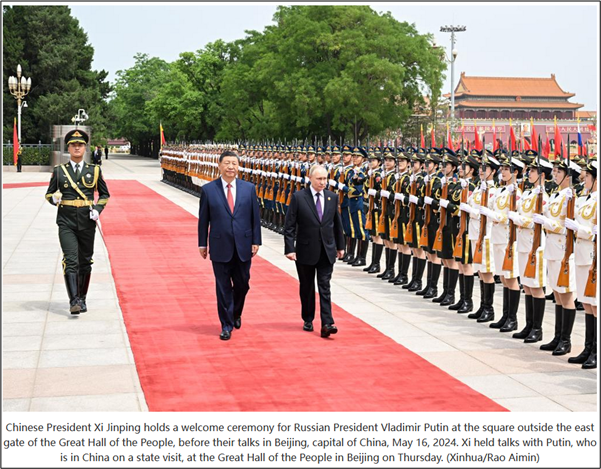
The visit to China will be held in two stages. The Russian president is scheduled to visit Beijing and Harbin.
In Beijing, Putin will hold a meeting with Xi. The two presidents are expected to hold full-fledged one-on-one talks and those involving delegations, as well as informal face-to-face talks. The Russian president has brought a large delegation consisting of five deputy prime ministers, heads of economic, diplomatic and security agencies, as well as heads of the Federal Service for Military-Technical Cooperation, Russian Railways, Rosatom and Roscosmos. In addition, senior officials from 20 Russian regions have come with the president.
The bilateral talks are planned to focus on trade and economic cooperation. At the meeting, Putin and Xi will also touch upon the most pressing political and regional issues. Ushakov said that the most important part of the Beijing talks will be an informal, closed-door meeting. In the “1+4 format” on each side, the two leaders will hold substantial talks on Ukraine.
The second stage of the state visit to China will take place in the city of Harbin, the capital and largest city of Heilongjiang Province. There, Putin will attend the opening ceremony of the 8th Russian-Chinese Expo and the 4th Russia-China Forum on Interregional Cooperation and will also meet with the students and teaching staff of the Harbin Institute of Technology. In addition, the president is scheduled to talk to journalists of the Kremlin pool.
Snapshots of the meeting – arrival & departure
Observe the big difference between arrivals and departures of Putin, Scholz and Blinken
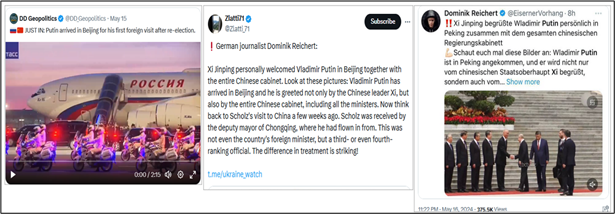
German journalist Dominik Reichert: Xi Jinping personally welcomed Vladimir Putin in Beijing together with the entire Chinese cabinet. Look at these pictures: Vladimir Putin has arrived in Beijing and he is greeted not only by the Chinese leader Xi but also by the entire Chinese cabinet, including all the ministers. Now think back to Scholz’s visit to China a few weeks ago. Scholz was received by the deputy mayor of Chongqing, where he had flown in from. This was not even the country’s foreign minister, but a third- or even fourth-ranking official. The difference in treatment is striking! The similar situation was in Blinken’s recent visit in China.
Arriving in Aurus and walking on the red carpet
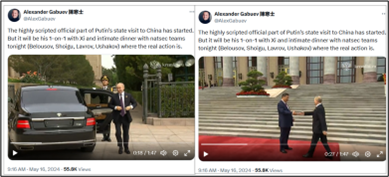
Show of force (nuke suitcases) and Dragon-Bear hugging
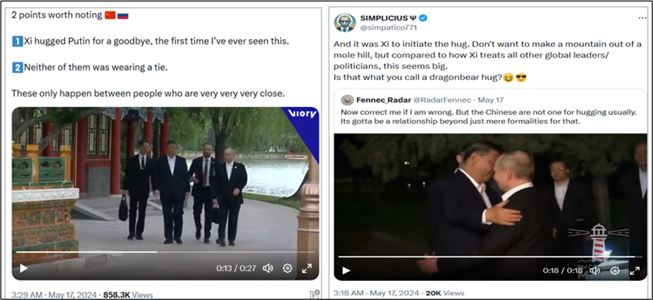
Assessed subject matters, signed deals and documents
Statements before the meeting
Before the meeting, Russian Presidential Aide Ushakov announced that China will not take part in the peace conference in Switzerland. Ushakov also added that Vladimir Putin and Xi Jinping will discuss Ukraine “in detail” at a one-on-one meeting in China on the evening of May 16. Trade and economic interaction will be a priority at the negotiations, given that China, since 2010, has become Russia’s leading foreign trade partner and that Russia last year moved up to fourth place among China’s counterparties.
Ushakov said that the agenda in Beijing can be called busy. In addition to the traditional ceremony of the official meeting, negotiations between the two leaders in a narrow format are planned, where the most important and many sensitive topics will be discussed. This will be followed by an expanded line-up with the participation of delegations of the two parties, which include members of the Russian government in an updated line-up and their counterparts from the State Council of the People’s Republic of China. It is expected that Putin will hold a separate meeting with Premier of the State Council of the People’s Republic of China Li Qiang.
This meeting is the latest sign of their growing alignment amid hardening global great power competition. Their meeting comes months ahead of the American presidential elections and as Washington faces mounting international backlash over its support for Israel’s war on Gaza. It’s set to provide a platform for the two leaders to discuss how all this can advance their shared ambition to degrade and offer an alternative to American power.
Putin will arrive for the two-day state visit emboldened by the growing wartime economy and amid a major new offensive along key points of the front line in Ukraine. For Xi, freshly returned from a European tour, the visit is an opportunity to showcase that his allegiance to Putin has not broken his ability to engage with the West.
Russia is fundamental to China’s grand strategy and its further development. While Beijing does not want more escalation in Ukraine or with the west by and large, there is a deep interest in making sure that Russia does not lose the war in Ukraine. Putin said before his trip to China that Russia is open to a dialogue on Ukraine but such negotiations must take into account the interests of all countries involved in the conflict, including Russia’s and he expressed positive views on China’s position on the Ukraine crisis.
Chinese analysts said that China will maintain communication with and mediation among all parties involved and now the key problem is that some other parties have shut down the door for negotiations and insist on a military solution.
Putin emphasized that the coordination of foreign policies between the two countries is propelling the establishment of a fair multipolar world order, which underpins the future success of the Russia-China comprehensive strategic partnership of coordination for the new era.
On the Ukraine crisis, Putin said China clearly understands the roots of the Ukraine crisis and its global geopolitical impact, as reflected in “China’s Position on the Political Settlement of the Ukraine Crisis,” a 12-point proposition issued by China in February 2023. The concepts and suggestions indicated in the document demonstrate the sincere desire of China to stabilize the situation, he added.
China, Russia, as well as the vast majority of the Global South all oppose unipolar world order with hegemonic dominance, unilateralism, protectionism and the double-standards and hypocrisy displayed by some Western countries, especially the US.
Meeting procedures
The Chinese president greeted his Russian counterpart at the Great Hall of the People, kicking off two days of discussions covering the war in Ukraine, conflicts in the Middle East, and cooperation on economics and defense.
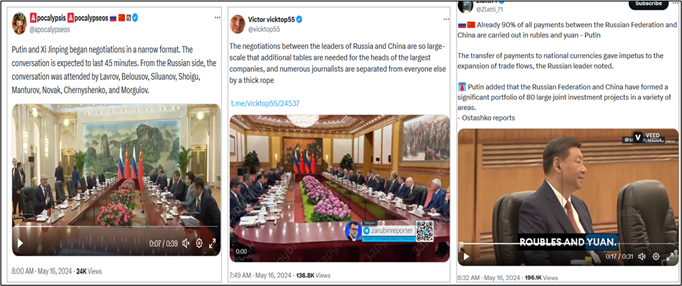
On May 16, Russian and Chinese Presidents, Vladimir Putin and Xi Jinping, have begun talks at the Great Hall of the People in Beijing.
The talks are expected to last for 45 minutes. The Russian delegation is represented by Foreign Minister Sergey Lavrov, First Deputy Prime Minister Denis Manturov, Deputy Prime Ministers Alexander Novak and Dmitry Chernyshenko, deputy head of the presidential administration Maxim Oreshkin, presidential aide Yury Ushakov, Russian Ambassador to China Igor Morgulov, Defense Minister Andrey Belousov, Finance Minister Anton Siluanov, Central Bank Governor Elvira Nabiullina, Director of the Federal Service for Military Technical Cooperation Dmitry Shugayev, and Roscomsos CEO Yury Borisov.
The Chinese side is represented by Director of the General Office of the Chinese Communist Party Cai Qi, Vice Premier of the State Council Ding Xuexiang, Director of the Office of the Central Commission for Foreign Affairs and Minister of Foreign Affairs Wang Yi, Vice Premier of the State Council He Lifeng, Vice Premier of the State Council Zhang Guoqing, State Council member Shen Yiqin, Chinese Ambassador to Russian Zhang Hanhui, and Deputy Foreign Minister Sun Weidong.
In Beijing, Russian and Chinese officials are to sign eleven intergovernmental documents and a joint statement on deepening comprehensive strategic partnership and coordination on the occasion of the 75th anniversary of the establishment of diplomatic relations between Russia and China.
With Western sanctions hitting Russia’s economy, analysts anticipate discussions on how to navigate these sanctions during the meetings. Talks are expected to focus also on the growing defense cooperation between Russia and China. Both countries were “deepening peaceful nuclear cooperation,” Putin said, without giving further information. Referring to Moscow’s ongoing war in Ukraine, Putin expressed gratitude toward Xi and China for “those initiatives it was putting forward to regulate this problem.” He added that the two had agreed to discuss foreign policy and the “Ukrainian crisis” at an informal meeting (1+4 formats) on Thursday evening.
Putin added that energy, industry and agriculture are among the priorities in the bilateral cooperation. The Russian president also noted the importance of cooperation in high technologies, innovation, infrastructure construction and transportation. “Humanitarian contacts are expanding. We will hold years of cultures of Russia and China in 2024-2025, in accordance with our agreement,” Putin said.
“Russia and China are successfully cooperating in the United Nations, BRICS, the Shanghai Cooperation Organization, as well as the G20. We are determined to further harmonize integration processes in the Eurasian space, to match the potentials of the Eurasian Economic Union and, my dear friend, your One Belt and Road Initiative,” Putin said.
The China-Russia Strategic Plan for a New Era. What is in the joint statement?
On May 16, Russian President Vladimir Putin and his Chinese counterpart Xi Jinping signed a joint statement on deepening strategic partnership relations, ushering in a new era amid the 75th anniversary of the establishment of diplomatic relations between the two countries. The document was signed after extensive Russian-Chinese negotiations and the document is over 30 pages long.
The parties emphasize a relationship beyond traditional military-political alliances, focusing on no alliance, no confrontation and not targeting any third party. Russia reaffirms Taiwan as an inalienable part of China and opposes any form of “Taiwan independence.” The parties focuse on enhancing strategic communication between defense departments. Commitment to deepening trade and investment ties, promoting projects in energy, technology, and the digital economy. Calls for objective investigations into the Nord Stream pipeline explosion and opposes politicizing virus origin tracing.
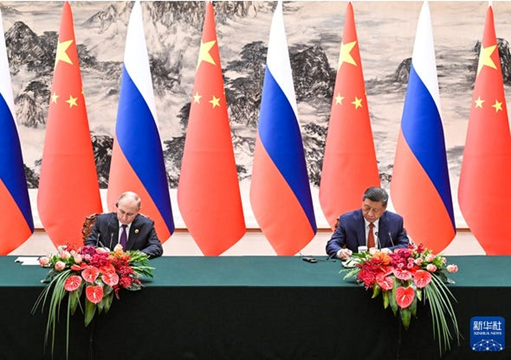
The Russian Federation and the People’s Republic of China issued a joint statement, which outlines a commitment to deepening their comprehensive strategic partnership. The statement highlights the following key points:
- Non-Allied Relationship: The countries reaffirm that their partnership transcends traditional military-political alliances, emphasizing a model of cooperation that does not target any third party and is based on mutual respect for each country’s development path.
- One-China Principle: Russia reaffirms its support for the one-China principle, recognizing Taiwan as an inalienable part of China and opposing any form of “Taiwan independence.”
- Security Cooperation: Both nations pledge to enhance cooperation in combating terrorism, extremism, and organized crime. They aim to strengthen strategic communication between their defense departments and conduct joint military exercises.
- Energy Collaboration: The statement commits to closer energy cooperation, including projects in oil, gas, coal, electricity, and nuclear energy, with an emphasis on promoting low-emission and renewable energy sources.
- Global Security Concerns: The joint statement expresses serious concerns over various international issues, including the AUKUS security pact, Japan’s handling of nuclear-contaminated water, and the biological military activities of the United States.
- Economic and Technological Cooperation: The two countries aim to deepen trade, investment, and technological cooperation, with plans to enhance exchanges in e-commerce, nuclear energy, and the digital economy. They also support the integration of the Beidou and GLONASS satellite navigation systems.
- Agricultural and Scientific Collaboration: There is a strong focus on expanding agricultural cooperation and scientific innovation, with initiatives such as the Sino-Russian Year of Science, Technology and Innovation.
- Cybersecurity and Space Exploration: The statement underscores the importance of cybersecurity and outlines plans for joint space exploration, including lunar missions and satellite communication systems.
The full transcript and video available in the link below:
The China-Russia Strategic Plan for a New Era
Summary, Press conference, and Text, May 20, 2024
The official information can be found on the website of President of Russia, State visit to China.
After the meetings in Beijing
The Russian leader told reporters that the document (joint statement) “sets new ambitious tasks and long-term objectives for the development of the entire complex of Russian-Chinese relations,” the achievement of which will be facilitated by the signing of a package of intergovernmental, interagency and trade agreements prepared for his visit to China.
Chinese President Xi Jinping and Russian counterpart Vladimir Putin gave some official statements after meeting in Beijing.
Xi Jinping said:
- China and Russia uphold the world order based on international law Beijing and Moscow intend to deepen political mutual trust, adhering to the non-alignment principle
- Relations between China and Russia have overcome difficulties to become even stronger over the past 75 years
- China and Russia think that a political settlement is the right way to resolve the crisis in Ukraine
- Hegemony, power politics and bloc confrontation directly threaten the security of all countries
Vladimir Putin said
- Putin has called it symbolic that his first foreign visit after his re-election for a new term was to China
- The relations between Moscow and Beijing are an example of building ties between neighbouring states
- Moscow is grateful to Beijing for suggestions on settling the situation in Ukraine
- Moscow and Beijing plan to deepen energy cooperation, both on hydrocarbons and in the peaceful use of nuclear energy
- Creating closed military-political alliances in the Asia-Pacific region (APAC) is harmful and counterproductive.
President Putin described Russian-Chinese cooperation in world affairs as “one of the main stabilizing factors in the international arena” after his meeting with President Xi Jinping. Putin said that “Russia and China are successfully cooperating in the United Nations, BRICS, the Shanghai Cooperation Organization, as well as the G20.” “We are determined to further harmonize integration processes in the Eurasian space, to match the potentials of the Eurasian Economic Union and your One Belt One Road Initiative,” Putin told his Chinese counterpart.
President Xi echoed Putin’s assessment of the importance of warm Russia-China ties, emphasizing that the stable development of the relationship will be “conducive to peace, stability and prosperity in the region and the world.” Russia-China ties have “become stronger over time, withstood the test of international storms and clouds, and set a model of mutual respect, frankness, harmony and mutual benefit,” Xi said. “After 75 years of solid accumulation, lasting friendship and all-round cooperation between China and Russia provide a strong impetus for the two countries to forge ahead despite wind and rain,” Xi assured.
Both leaders affirmed their friendship and their vision of a multipolar world based on partnership and mutual benefit. Putin and Xi signed numerous agreements on a wide range of trade and development projects covering energy, technology, engineering, construction, agriculture, infrastructure and military defense.
Putin brought virtually every major figure of the Russian government with him. Furthermore, key representatives of businesses and oligarchs are part of the expanded delegation. Such a list of decision-makers from the financial and economic sectors suggests that this delegation is not ordinary but rather an ambitious and serious effort to deepen economic and financial cooperation with China.
Russia and China are truly shaping up to lead the world together through this century, reshaping the international order into one based on multipolar principles rather than the imagined “rules-based order” trap of the falling Anglo-American Empire.
Putin to visit Harbin on second day of visit to China (May 17)
During his visit to the administrative center of China’s northernmost Heilongjiang province, the russian president will be accompanied by Chinese Vice President Han Zheng
Putin’s schedule includes participation in the opening ceremony of the 8th Russia-China Expo and the Russian-Chinese Forum on Interregional Cooperation. Putin will be accompanied by members of the Russian delegation, including heads of more than 20 Russian regions, and Russian businessmen.
The Russia-China Expo is a trade and industry exhibition and a platform for talks on cooperation in trade, economy and investment, as well as an opportunity to exchange technologies and broaden contacts between Russian and Chinese regions. This is a key platform for contacts between Russian and Chinese businesses, offering an opportunity to build a direct dialogue and sign mutually beneficial agreements. A total of 16 Russian and 13 Chinese regions will organize their displays. Around 190 Chinese and 170 Russian companies are expected to take part.
On the sidelines of the event, Putin will hold a brief meeting with Han Zheng and the administration of the Heilongjiang province.
In addition, the Russian president visited the Harbin Institute of Technology, which has broad ties with Russian universities, including the Bauman Moscow State Technical University, the Lomonosov Moscow State University and the St. Petersburg State University. After that, the president will traditionally field questions from reporters of the Kremlin pool, who are covering his visit to China.
The president will visit the Church of the Protection of the Blessed Virgin Mary – the city’s only Orthodox Christian church – and lay a wreath at the Monument to the Soviet soldiers who died in the battles for the liberation of China’s northeast from Japanese invaders.
The future is bright for China-Russia relations, Chinese President Xi Jinping said. “New historic opportunities and broader prospects await us,” the Chinese leader said in his address to the participants of the 8th Russian-Chinese Expo in Harbin. According to him, China-Russia relations have entered a new era. He recalled that this year marks the 75th anniversary of the establishment of diplomatic relations between the two countries. “I warmly congratulate the 8th China-Russia Expo,” Xi added.
On May 17-21, Harbin hosts the 8th Russian-Chinese Expo, where numerous businesses and 16 Russian regions will present their stands. It is expected to stimulate the socio-economic development of the two countries, make better use of their investment opportunities, encourage the implementation of joint projects, and increase the supply of quality products. The area of the whole exhibition encompasses 388,000 square meters. Over 5,000 types of goods are presented there.
Assessment of the visit in great power context
There are two important things to understand about the symbolic component of Putin’s visit to China:
- This is the first trip after the inauguration. In international relations, this is of great importance, leaders go to their strategic partner to outline priorities. Respectively, last fall Xi Jinping did exactly the same thing, which he himself emphasized: “I am very pleased to visit Russia on a state visit, especially immediately after my next re-election as Chairman of the People’s Republic of China, and I chose Russia as the first country of my foreign visit.”
- This is a state visit, that is, the highest of all possible levels. This is possible only once during the entire current term of office. Now that Putin immediately played trump cards, this is also a serious sign. The Chinese read all these signs perfectly and fully appreciate them.
In addition, Putin emphasized the roles and tasks of Russia and China: “We need to strengthen the emerging multipolar world. There is no doubt that it is now taking shape before our eyes and the world is becoming multipolar, I think that everyone understands this perfectly well, they are aware of this.” Trade between Russia and China has surged to a record $240 billion in 2023, a 26.3% increase from 2022. Aggressive US sanctions and tariffs have strengthened the Russia-China partnership. China’s imports from Russia, including oil and gas, have soared, while Chinese exports of vehicles, machinery, and electronics to Russia have dramatically increased. Putin’s visit to Beijing to meet Xi underscores their expanding economic cooperation.
US Foreign Policy gurus spinning in their graves
President Putin’s visit to China (his 18th to date) comes less than 48 hours after the US slapped tough new 25-100% tariffs on a broad array of Chinese goods, from critical minerals, steel and aluminum to lithium batteries, semiconductors, solar power cells, ship-to-shore cranes, electric vehicles and medical products. The restrictions, announced following a review of Trump-era policies amounting to a multitrillion dollar US trade war against Beijing, were blasted by China’s Commerce Ministry as a severe “violation” of Washington’s commitment “not to seek to suppress or contain China’s development.”
“Russia and China want to challenge the international order “, White House Strategic Communications Coordinator Kirby said to journalists. He admitted that Washington is concerned about strengthening relations between the two countries. “These two states, their leaders, in clearly different ways, act around the world contrary to our national security interests, contrary to the interests of many of our allies and partners,” Kirby emphasized.
Restrictions against China, complementing the thousands of sanctions Washington and its allies have slapped on Russia over the past decade, threaten to put the last nail in the coffin of the grand strategy Washington has pursued in relation to both countries through much of the second half of the 20th century. The vision, laid out by foreign policy gurus Henry Kissinger and Zbigniew Brzezinski, centered around efforts to keep Russia and China divided to prevent them from combining their respective strengths to challenge American hegemony.
“A grand coalition of China and Russia united not by ideology but by complementary grievances” would pose “the most dangerous scenario” as far as threats to US hegemony are concerned, Brzezinski wrote in his 1997 treatise ‘The Grand Chessboard’, echoing and building on work begun by Kissinger in the early 1970s to institute his famous ‘triangular diplomacy’ doctrine in relation toward Moscow and Beijing.
Contemporary US foreign policy leaders appear to cancel this old strategy, first sabotaging relations with Russia, staging coups along its perimeter and ignoring Moscow’s security concerns by expanding NATO and then kicking off a similar process against China, launching a trade war, strengthening anti-China security alliances in the Asia-Pacific, provoking Beijing over Taiwan, and most recently, flirting with the idea of turning the AUKUS security alliance into a new anti-China “Asian NATO”. Both nations find themselves targeted by a long-standing, aggressive US foreign policy of encirclement and containment, making cooperation together a logical choice.
For many years Russia, China and a growing list of other nations targeted by US-led sanctions have been working on alternative financial, economic, and trade mechanisms to sidestep such sanctions and continue building both national and regional self-sufficiency as well as economic strength. These efforts have finally reached a critical mass, displacing dependence on the US dollar and allowing Russia, China, and many other nations to now insulate themselves from the impact of Western sanctions.
Economic cooperation is key to Russia and China’s partnership. Russia’s vast natural resources, coupled with China’s immense industrial base, represent more than a match for the collective West’s economic power.
Accordingly, the two countries’ cooperation, and moves by other nations targeted and coerced by the collective West to join this new economic pole, will eventually build “the critical mass required for Russia and China’s multipolar vision to permanently overtake the US-led unipolar world order”.
Putin’s visit on the heels of the US tariff hike announcement could not have come at a better time, providing Russian producers new opportunities to expand their footprint in China’s markets, and giving Beijing with a solid, trusted economic partner in an uncertain world.
Regardless of who comes to power in the United States after the elections, difficulties in US-China relations are most likely to persist. This relationship will continue to face many challenges. In these conditions, ensuring the stability of foreign economic cooperation and supply chains, cooperation with countries with which there is a high level of strategic mutual trust, especially with neighboring countries, is a priority area of development for China. With Russia-China relations entering a “new era,” cooperation can be expected to expand into new areas, including agriculture. Due to the long common border, their ability to stably and safely trade overland instead of by sea gives both the opportunity to substantially “reduce risks in global trade.”
Washington’s attempts to restrict Russian and Chinese development using punitive economic tools may seem like the right approach to restricting both countries’ growth but are actually counterproductive, threatening the very foundations on which America’s economic prosperity rests. More and more countries are to adapt to the new ways of trading without the US dollar.
Two important videos
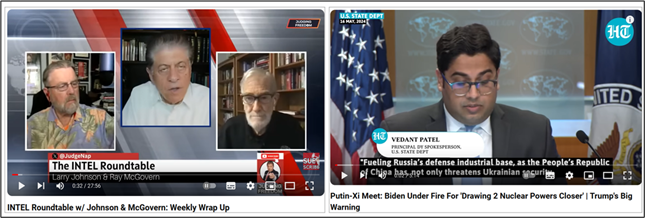
Putin-Xi Meet: Biden Under Fire For ‘Drawing 2 Nuclear Powers Closer’ | Trump’s Big Warning
Hindustan Times , May 17, 2024
INTEL Roundtable w/ Johnson & McGovern: Weekly Wrap Up
Judge Napolitano – Judging Freedom , May 18, 2024


